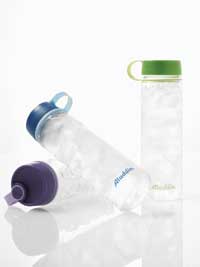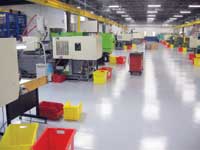Short Shots: From the Industry Floor 20893
BPA concerns growing
June 1, 2008
|
BPA concerns growing
Wal-Mart and Nalgene are busy phasing out polycarbonate bottles in response to a recent study conducted by a coalition of U.S. and Canadian environmental health organizations, which found 19 out of 19 popular baby bottle brands leached bisphenol A (BPA) at levels of 5-8 parts per billion when heated. BPA, long a component of PC, mimics the reproductive hormone estrogen. Another study released shortly afterward found that exposing polycarbonate bottles to boiling water can release BPA 55 times faster than normal.
Experts differ on whether or not exposure to these levels of BPA causes damage to humans. However, public opinion fueled by prime time news stories and front-page headlines is weighing heavily in the matter, according to industry sources.
Reduction of demand for polycarbonate bottles is not expected to significantly -impact overall demand for the resin. It is estimated that water and baby bottle applications represent 5-10% of total demand.
Almost immediately after the first study was released, Wal-Mart (Bentonville, AR) said it would phase out PC baby bottles in favor of those made from different plastics or glass. In a statement released to the media, the company said that safety is a top priority and even though the FDA has not restricted BPA, it will voluntarily phase out the bottles and expand its BPA-free offerings. The phase out is due to be completed early next year.
After some back and forth on the matter, water bottle manufacturer Nalgene (Rochester, NY) also announced it would replace the PC it uses to mold its lines of bottles with a BPA-free alternative, a copolyester material from Eastman called Tritan, introduced at the K 2007 Show in Germany. CamelBak Products (Petaluma, CA) has also announced it will switch to Tritan, which has been touted as a BPA-free replacement for polycarbonate. Aladdin (Seattle, WA) -recently introduced a new product line of water bottles called Clean & Clever at the International Home and Housewares Show 2008 in Chicago made from Tritan as well. The material is also said to supply heat resistance needed for dishwasher durability.
—MM
|
Autodesk set to acquire Moldflow
Autodesk (San Rafael, CA), a leading 2-D and 3-D CAD software and technology provider with 2008 net revenue of $2.17 billion, announced on May 1 that it intends to acquire plastics simulation software provider Moldflow (Framingham, MA).
Peter Rucinski, Moldflow’s marketing director, tells IMM that for the short term, it will be business as usual, and that longer term plans are positive. “We released a letter to customers today -explaining that Autodesk intends to fully support current Moldflow customers,” he says. “In addition, it intends to continue to develop and support our products and services. This includes maintaining all CAD and CAE solutions as well as providing data integration for all products.”
Moldflow currently owns 80-85% of the global market for plastic mold filling analysis, and customers run all major CAD systems on the market. Says Rucinski, “If a customer encounters a problem designing a part in plastic, our products will help them solve it no matter what kind of CAD system they have.”
In January 2006, Autodesk purchased Alias, a 3-D graphics software developer, for $197 million. A strong company with a diverse user base, it has benefited from its parent’s support. “There’s no reason to believe this will not be the case for Moldflow,” Rucinski adds.
—MM
New spot market from IDES
Plastics database giant IDES (Laramie, WY) has launched a 5-million lb spot market listing called The Plastics Marketplace, which carries resins in average truckload quantities for purchase from reputable suppliers. IDES president Mike Kmetz tells IMM that the material will include virgin prime, regrind, and reprocessed (repelletized) versions. “We’re off to a good start with the website getting about 500 hits a day. We list plastics for sale in our marketplace from distributors, brokers, and other suppliers,” says Kmetz. “Both resin buyers and sellers like the service because it provides them with a simplified method to connect.”
Information on each material includes the listing date, generic family, product name and description, forms, packaging, color, pounds, price per pound, and geographic location including city, state, and country.
The idea for the marketplace came about as a result of customers contacting IDES looking for actual materials. “Even major distributors have excess inventory they haven’t been able to sell, so this puts them in direct contact with the seller,” Kmetz adds.
Kmetz believes that, over time, more buyers will be looking for secondary and recycled resin as prices get higher. “Up to a quarter million pound lot has been listed, and some suppliers list ongoing availability, so users could potentially hook up with a continuing source of reprocessed or regrind materials,” he says.
IDES offers an e-mail alert service when new materials are added. As of the first week of May, 600 people had signed up for that service. There is no sign-up required to use the marketplace itself. Visit http://www.ides.com/marketplace/default.aspx for more information.
—MM
Taking an auto industry pulse
This year’s 14th annual DuPont Automotive/SAE Survey shows a surprising change from years past. Rather than cost reduction ringing in as the top challenge, attendees to the SAE World Congress emphasized the environment in their responses.
“While 32% said cost reduction is the industry’s top challenge, that’s flat year over year,” says Chris Murphy, automotive director, Americas, DuPont Automotive Performance Materials. “What’s really new this year is the emphasis on the environment. We not only saw significant increases in the number of respondents who said environmental challenges are paramount, we also saw environmental challenges driving fuel, powertrain, and vehicle design and development as a differentiator in the consumer marketplace.
“Put it all together with insights into how best to strengthen the industry, and the mantra for automotive designers and engineers this year is: ‘work together to design and develop cost effective, fuel efficient, environmentally friendly vehicles’,” Murphy adds.
—MM
ProMold plastics moves, expands
A 40-year-old Connecticut contract manufacturer and moldmaker recently moved into a big, new facility in a new town in Connecticut, after outgrowing a facility it had occupied since 1982 and had expanded twice to 20,000 ft2. It’s ProMold Plastics (www.promoldplastics.com), formerly of Cromwell, CT, now residing in a 43,000 ft2 facility in Portland, CT.
“What seemed to be a big undertaking at first really turned out to be a breeze. All the contractors working on the building clearly understood my vision, and in some cases, exceeded my expectations,” says Richard Puglielli, president. “We will be able to immediately reap the benefits of increased efficiency and capacity to support our customers’ current and -future growth.” Just in the past year, he says he created 12 new jobs to expand the company’s support staff.
ProMold Plastics reported that it celebrated its 40th anniversary last year with record sales and was an honoree finalist in the UConn Family Business of the Year Awards. Also, Puglielli was named one of the 25 Notable Processors around the globe to make a positive impact within the plastics industry by Modern Plastics magazine last year.
“Managing all the aspects of our move was facilitated by many organizations within Connecticut, and I am grateful for all the support and assistance we have received,” says Mr. Puglielli. “The Connecticut Department of Economic and Community Development consistently followed up with us to ensure we were taking advantage of all the incentives and benefits they offer to manufacturers within Connecticut. The Town of Portland has also been very welcoming and helped move this major undertaking forward.”
—CK
|
Sub-micron optical molding
It’s reportedly a first—an injection molding process optimized to match the accuracy and quality of diamond-turned glass. It’s been done by Fosta-Tek Optics (Leominster, MA; www.fosta-tek.com) to mass-produce precision military sighting system lenses in a lightweight, high-quality polyolefin at a fraction of the cost of machined glass. Fosta-Tek is a leading North American supplier of military, safety, and consumer lenses, industrial optics, and optical coatings.
“The idea, of course, is to reduce part weight and unit cost, but to do this with injection molding, you really need to precisely control the surface contours. So you’re dealing with a lot,” says Fosta-Tek VP Jim LeBlanc. “There are tooling and temperature issues, mold shrinkage, induced distortion caused by shrinkage, and more. What we’ve been able to do is duplicate a high-quality optical surface very accurately and predictably. We’re talking sub-micron level tolerances.”
The parts are extremely complex, double-sided aspheres, 1.5-6 mm thick with diameters down to 3/8 inch. The specifications called for lens form accuracy of less than 5 µm peak to valley, 4 waves/surface, surface roughness of less than 10 nm, RMS measured with laser interferometry, and a total transmitted wave-front distortion of under 14 fringes.
“To appreciate the level of difficulty involved,” says Bill Blankenship, Fosta-Tek’s chief engineer, “we were looking at a shrinkage rate of 0.006 per inch on an optic that’s less than an inch across. So we had to be very accurate with our shrinkage prediction and make sure our process provided micron-level repeatability.”
Precise mold temperature and pressure control was key to achieving the process control required. In a vibration-free metrology lab equipped with a Zygo GPI interferometer, the company conducted injection-compression mold trials on a 60-ton Engel, running a two-cavity mold equipped with Kistler cavity-pressure sensors to close the loop. Fosta-Tek also insulated the mold from the press, so the machine wouldn’t act as a heat sink. After extensive experimentation and fine-tuning, LeBlanc and company achieved success.
“Other factors may come into play as we tweak the process to improve productivity down the road, but the important thing right now is that even at cycle times of six minutes, the impact on production rates is enormous,” says LeBlanc. “We think that’s a milestone for the process.”
—CK
DAK Americas joins Climate Registry
Materials producer DAK Americas (Charlotte, NC) will report its greenhouse gas emissions as a new member of The Climate Registry (Washington, DC), a newly established non-profit group that measures and reports emissions in a common, accurate manner. The environmental watchdog group’s founders include 39 U.S. states, six Canadian provinces, three Native American tribes, two Mexican states, and the District of Columbia. DAK produces PET material, along with fibers, and raw materials for polyester-based products, and is an industry leader in pursuing environmentally-friendly and cost-effective solutions for supplying sustainable products, according to its president, Hector Camberos.
—MM
New Thermold owner sets goals for expansion
Jeremy Schwimmer, the new owner of 63-year-old plastic parts manufacturer Thermold (Canasota, NY) plans to increase staff next year from 35 to 100, and to spend $1 million on purchasing additional machinery. Schwimmer acquired the company from former owners (and consultants during the transition) Ronald Farley and Huntington Ethridge III, and is leasing the 40,000ft2 facility from them.
—KD
About the Author(s)
You May Also Like






